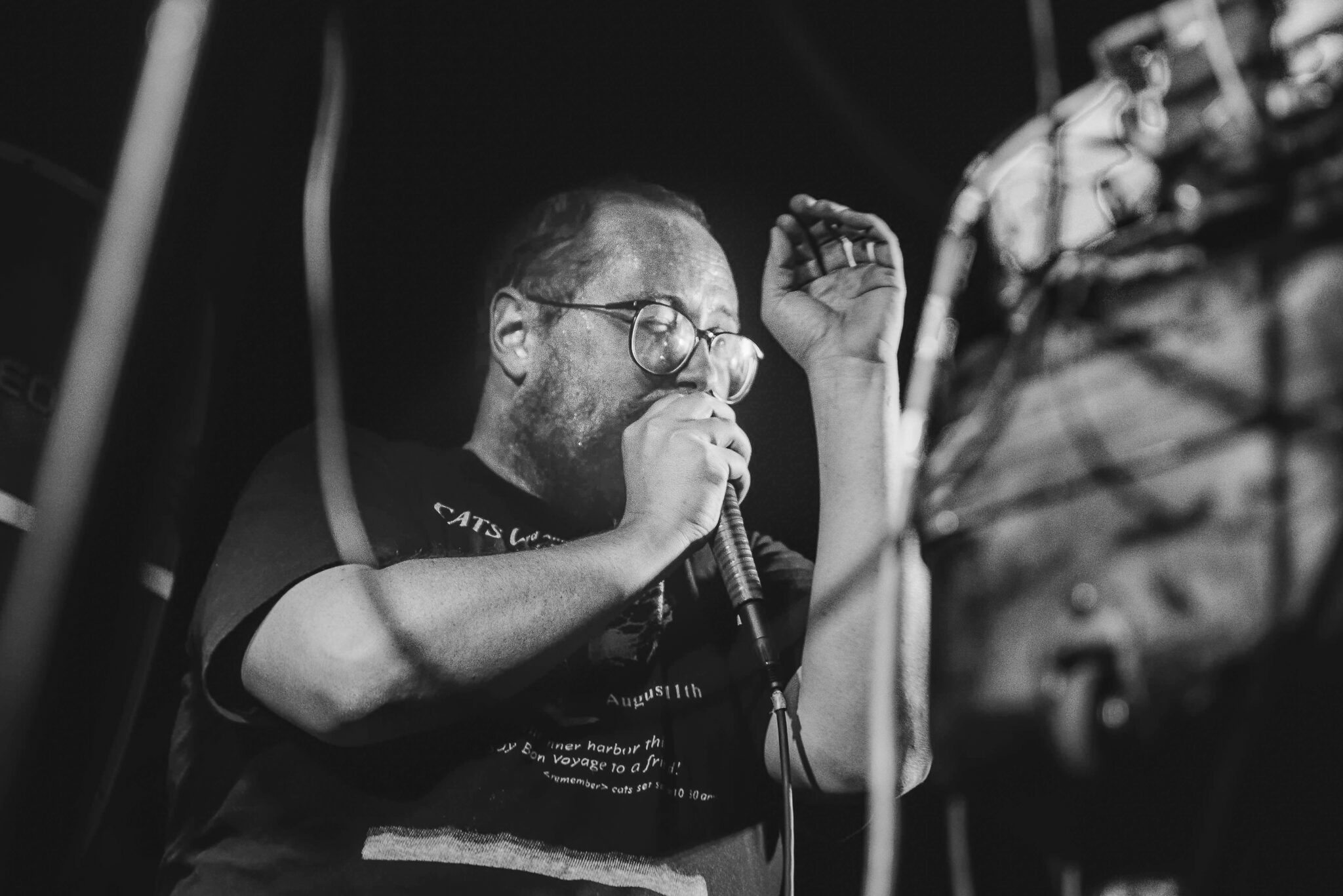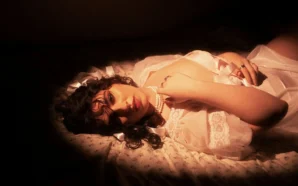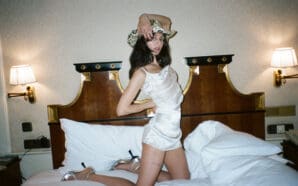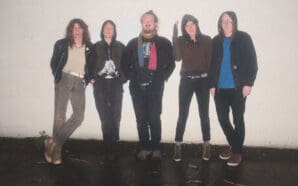Dan Deacon is nothing short of an electronic mastermind. Creator of infectious compositions and compelling melodies, Deacon became a household name in the electronic world after the success of 2008’s Spiderman of the Rings. In 2012, Deacon released America, which led to a new direction for the producer, using live instrumentals for the first time. Now Dan Deacon is back to his synthetic roots with his newest release, Gliss Riffer, once again encompassing a first – the use of the new Sub 37 synth.
In anticipation of his upcoming show in Philadelphia, I chatted with Dan Deacon about this new ‘first,’ his lyrical progression, as well as our desires to relax.
Erika: The last time I saw you live was two years ago when you opened for Animal Collective at Union Transfer. I’m a huge Animal Collective fan, but I have to admit you stole the show. When I was writing my review, I described you as the ‘dictator of dance music,’ in the way the crowd becomes consumed by you during your live show. Do you ever feel that power when performing?
Dan Deacon: I actually think about it the other way around in that the audience has taken over the show. I don’t really think of myself as a dictator [laughs]. I like how the audience becomes the performance and the fans become the performers. I was the catalyst to start the process, and then the audience takes that process and puts it in the direction they want to take it.
Erika: Speaking of your shows, did you always have the intention to interact with the crowd?
Dan Deacon: Well, I guess so. I haven’t really thought about it up until recently when people started asking ‘How long have you been doing this?’ and I realized I guess the whole time [laughs]. When you make electronic music, there’s not a lot of traditional music-playing happening. Music is theater and you want your theater to be as engaging as possible, so that’s why I wanted to give the audience different ways to enjoy the show night after night. One of the only things I know I’m going to have at a show is audience members, and then you think about what you can do and how you can improvise to a room full of strangers. You can switch it from everyone looking at the stage to everyone looking at each other.
Erika: You recently finished supporting Arcade Fire on tour, playing arenas. How did that compare to performing in smaller, more intimate settings?
Dan Deacon: It was very different, and I’ve realized there are different categories of shows. Each show has a different approach and different psychology to the audience. The headlining shows, people are coming to see you. They’ve heard you, so it’s a very different mindset. Then there’s the festival setting where there are a billion bands playing and people are there to only see a handful of them. They’re there to discover new bands and there’s an element of discovery that’s present. The audience is down to be like ‘Check it out!’ Then there’s the opening slot, and especially at a much larger show like the Arcade Fire tour, the audience is going to see… NOT you [laughs]. When I’m opening I have to perform, and I have to perform not only well enough to be tolerated, but to be remembered. You want to get the audience to be like, ‘That was great!’ or ‘What was that?’ …or at least say ‘Thank you.”
Erika: I’ve had Gliss Riffer on repeat since its release; and I’ve found myself really connecting with the lyrics. Do you feel like you’ve progressed with your writing over your last few albums?
Dan Deacon: I hope so. It’d be terrible if I weren’t progressing. I think I focused on the lyrics more this time around; it wasn’t just jibberish.
It’s not that I didn’t care about the vocal content, I just wanted vocals there as another texture. When I started recording for real, I realized the importance of the voice and how people latch onto lyrics. When people can sing along, they react differently. Then I started realizing the voice is the only instrument that can have lyrics. If I want to go through the process of sculpting the aspect of every sound, then why am I not doing that as heavily with the lyrics as I am with the texture of the voice? That’s why on this record I realized I needed to focus on the lyrics more. Luckily I’ve been listening to more lyric-based music like Joanna Newsom and Bob Dylan, and without realizing it I was like ‘Lyrics are cool.’ Everyone likes lyrics, but when I listen to music I’m not really a lyrical listener, I listen to everything.
I was at karaoke last night… which is why I’m hungover; but they project the lyrics to the songs. They’re playing songs like ’99 Red Balloons’ and all these other ones I’ve heard a million times and I’m like, ‘I can’t believe these are the lyrics. These are good lyrics.’
Erika: I found myself relating to the lyrics on ‘Learning to Relax.’ I’m the worst at relaxing, and I try to make it a point to remind myself to do it on a daily basis.
Dan Deacon: Well it’s good you remind yourself, people tend to forget.
Erika: It doesn’t always work, but I try [laughs].
Dan Deacon: I haven’t learned to relax, I’m learning. If I do learn I’ll let you know.
Erika: Make that your next track, when you do finally learn to do it.
Dan Deacon: Yes! [laughs]
Erika: You incorporated the Sub 37 on Gliss Riffer. How did that go considering it was never used before?
Dan Deacon: It was cool. It was really exciting knowing we were the first, and this was the first album that was going to record this synth, and this was the first piece of music to be written for this synth. This was an instrument I never used before. There was no manual and it wasn’t even finished being programmed, so when we had a question the engineers would come over and show us or be like ‘We’ll figure out what you mean.’ It was really cool, though. The people at Moog are like actual wizards. We’d always ask them how to do something and they’d always be like, ‘Just give us a moment’ and they’d whip it together.
We were also doing things they said they haven’t seen before. We changed 19 synths together to make 19 monophonic synths into polyphonic synths. Luckily they have them because they make them, but they were like ‘I think the most we’ve ever done is 8, we don’t know if we can do more.’ We just kept going and going, it was fun. It’s even fun when it goes wrong so you can figure out what to do and how to work around it.
Erika: I always think of your music like a puzzle – so many components put together. When creating new music, which part do you focus on first?
Dan Deacon: It’s kind of like sketching in a sketchpad. There’s no form that emerges until you take it out of the sketchpad and put it on a real page. I really drift in a million different ways until I hear something or I’m like ‘Oh, this is now something worth finishing.’
I’m always working on music when I’m on tour whenever there’s any down time; making something just to make it. Then you’ll hit that moment where you’re like ‘What’s that?’ and it pulls you in deeper. I’m sure it’s similar to your photo-taking process. You’ll take a million photos and then you’ll pick one and say ‘Oh, this is it’ and then you focus on that, trying it in different angles. Then there’s the editing process to figure out which one actually is the best, and of that figure out how to crop it and adjust the levels.
Erika: Definitely, it’s a constant learning process. You take what works well and incorporate that next time. It’s an ever-evolving process.
Dan Deacon: And I like seeing music like a puzzle because you always have to figure it out. It’s not like there’s a PDF you can download that tells you what’s next.
Erika: You’re referred to as an electronic musician. There are often people who say electronic music isn’t “real” music because it’s simply pushing buttons (which I strongly disagree). What’s your take on that? What does “electronic” mean to you?
Dan Deacon: Making electronic music just means you make music with instruments that create sound synthetically, rather than the vibrating of a chamber or a tube or string. You’re creating sound through something that requires speakers.
I mean playing the pianos is pushing buttons. I think the problem people have with electronic music is that it’s hard for there to be a virtual ethic nature to it in the performance of it. It’s like film where it’s made ahead of time and later you present it. That’s why with my electronic music I try to add human element of performance.
I think of myself as an electronic musician because that’s mainly what I make. If I played guitar I’d think of myself as a guitarist. It’s my vessel for self-expression. It’s my studio. It’s my sketchpad. I do like writing non-electronic music as well, but I don’t do enough of it to justify I’m doing that. I normally just say I’m a musician and if people ask what I do then I say I make electronic music.
Erika: You’re on tour until August; what’s next for you?
Dan Deacon: I have a couple projects in mind and I want to see if I can execute them on the road. I’m also looking forward to some downtime in the summer before getting back into the studio.
If you weren’t able to score tickets to Dan Deacon’s sold-out show at the First Unitarian Church Friday night, be sure to check back with Philthy Mag for full coverage!
